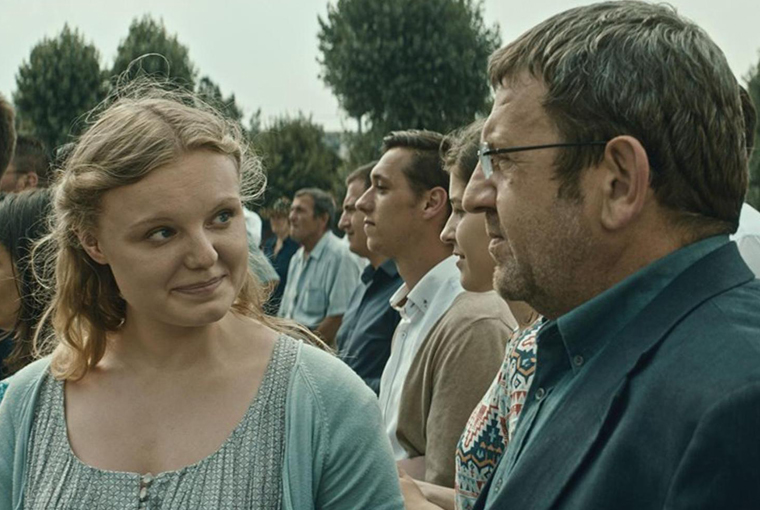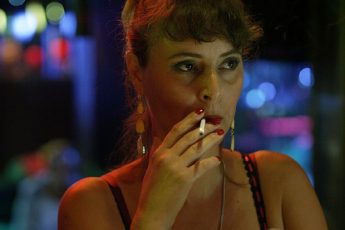O Romeo, Romeo
Cristian Mungiu’s Graduation (Bacalaureat, 2016)
Vol. 67 (September 2016) by Colette de Castro
In the first part of Graduation, we watch Romeo and a beautiful younger woman lying naked in bed as they exchange lingering caresses. Their complicity is almost tangible. It has a lustful urgency about it that describes the situation to the viewer without the need for words – we understand that we’re witnessing the sweetest moments of an extra-marital affair.
The special way of filming this intimacy – forced casualness and fragile egos – reminded me of another film – Radu Muntean’s 2010 Tuesday After Christmas. In fact, I was so convinced by the stylistic similarity that I confused the two Romanian directors. Perhaps Graduation was a sort of sequel to that film, a sequel in which Muntean experiments with the results of having an affair when one’s grown-up child is about to graduate and everyone involved is just that little bit older (in Tuesday the daughter in the story is still a pre-teen). But although the director seems to have been inspired by Muntean’s style of filming infidelity and while Tuesday is just about as close to perfection as any film can come to be – small and simple in form and yet grandiose in content and evocation -, Graduation is made by Cristian Mungiu, another Romanian arthouse director who’s known for directing slow masterpieces. It is an extended meditation on not only the human condition, but also on the human body, and the body of the actor.
While Mungiu has previously been most successful in the portrayal of actresses (both 4 Months, 3 Weeks and 2 Days and Beyond the Hills featured strong female characters), here we are presented with a work that focuses on an actor: Romeo, played perfectly by Adrian Titieni. Romeo could be the ideal father. He’s respected in his community and cares about his daughter’s life above all. Almost despite himself he puts her slightest desire or concern over his own romantic relationships, no matter what the consequences.
Some may recognize Titieni from Adrian Sitaru’s recent Illegitimate. In both Illegitimate and Graduation Titieni is typecast into playing the role of a father who is also a doctor. His tall stature, general hairiness and delicate manner make this an understandable choice. Illegitimate deals with the questions of abortion and incest and reminds the viewer of the dangers of hypocrisy. Whereas in Illegitimate the father character is explicitly held accountable for what he may or may not have done professionally during communism, here it is the opposite. It is in Titieni’s physical presence that we must find the backstory. His acting holds a plethora of presence – who needs method acting when history is written into your very body? When he talks about what he and his wife gave up in order to come back to the country, we can see the way he holds that history in his body. His acting makes us understand his sacrifice.
Whose sacrifice is the greatest? That of the parents, who are willing to put their hard-earned reputations and even their morals on the line for the sake of an ungrateful daughter? Or that of the daughter, who, after an accident where she hurts her writing hand, is encouraged by her father to underline just three words on the exam paper, for his friends on the board to single her out among the piles of hopefuls. She thus risks not only her grade, but also her fragile moral identity.
While driving, Romeo listens to the tender strains of the Handel aria “Ombra Mai Fu”, which becomes the refrain of the film. At the beginning, his golden-haired daughter listens with him. She shares her thoughts from the back of the car, and their eyes often meet in the rear-view mirror. But as the film progresses, she loses interest in what her father may have to teach her and plugs headphones into her iPod, her gaze now directed at what’s happening outside. This mirrors the disintegration of the family, and also, unfortunately of the film. As the daughter loses interest in her father, so do we.
While the core of the film is a success, added to this are unnecessary layers which weaken the piece. To the father-daughter relationship are added complications with his wife and mistress, and on top of that an elderly mother who occasionally needs emergency visits. These additions seem to be used only as plot devices. A mysterious threat of violence which hangs over Romeo’s head and occasionally manifests itself in the form of small attacks on his car and house, is left disappointingly unexplored.
Romeo embodies sacrifice, but when he’s unable to help his daughter he also subsumes helplessness. When he cries under the dappled trees or when he is punched to the ground by his daughter’s boyfriend, we feel for him in a new way. His daughter seems to sense this too, which is what makes it all the more difficult to go against his dearest wish, which is for her to leave and never come back. He looks at his daughter steadily and yet with longing: “Soon you’ll be in Kensington Gardens with squirrels around you.”
Luckily, since Mungiu’s Palme d’Or debut, Mungiu has lost none of his touch with actors. They still move and vibrate to their own rhythms inside their own intricate worlds, opening up just enough to share it with us and reveal more about ourselves.




Leave a Comment